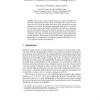Free Online Productivity Tools
i2Speak
i2Symbol
i2OCR
iTex2Img
iWeb2Print
iWeb2Shot
i2Type
iPdf2Split
iPdf2Merge
i2Bopomofo
i2Arabic
i2Style
i2Image
i2PDF
iLatex2Rtf
Sci2ools
127
click to vote
ESORICS
2010
Springer
2010
Springer
Election Verifiability in Electronic Voting Protocols
We present a formal, symbolic definition of election verifiability for electronic voting protocols in the context of the applied pi calculus. Our definition is given in terms of boolean tests which can be performed on the data produced by an election. The definition distinguishes three aspects of verifiability: individual, universal and eligibility verifiability. It also allows us to determine precisely which aspects of the system's hardware and software must be trusted for the purpose of election verifiability. In contrast with earlier work our definition is compatible with a large class of electronic voting schemes, including those based on blind signatures, homomorphic encryption and mixnets. We demonstrate the applicability of our formalism by analysing three protocols: FOO, Helios 2.0, and Civitas (the latter two have been deployed).
Election Verifiability | Electronic Voting | Electronic Voting Protocols | ESORICS 2010 | Security Privacy |
Related Content
| Added | 09 Nov 2010 |
| Updated | 09 Nov 2010 |
| Type | Conference |
| Year | 2010 |
| Where | ESORICS |
| Authors | Steve Kremer, Mark Ryan, Ben Smyth |
Comments (0)

